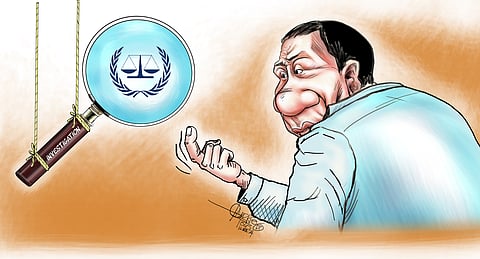
- NEWS
- the EDIT
- COMMENTARY
- BUSINESS
- LIFE
- SHOW
- ACTION
- GLOBAL GOALS
- SNAPS
- DYARYO TIRADA
- MORE

In clear categorical terms, former President Rodrigo Duterte last Wednesday boldly dared the International Criminal Court (ICC) to come and face him, pronto. “Hurry up, come here and start the investigation” into his supposed culpability in the death of thousands of Filipinos during his administration’s drug war, he declared before members of the House quad committee.
“This issue has been left hanging for many years, baka mamatay (na) ako, hindi na nila ako ma imbestiga (I might die and they can no longer investigate me),” he said during his appearance last Wednesday at the House hearing on his administration’s drug war.
Queried if he would be willing to answer questions posed by the ICC , Duterte said, “The ICC does not scare me a bit; they can come here anytime…(if found guilty) I’m willing to go to prison and rot there for all time.”
Some people, however, believe the former president was merely displaying his characteristic bravado, a performance meant to wow his supporters when, in fact, “he is just bluffing,” as far as critics like bemedaled former naval officer and ex-senator Antonio Trillanes are concerned.
Asked by media what he thought of Duterte’s utterances at the House hearing, President Ferdinand R. Marcos Jr. said, “If that’s what he (Duterte) wants we will not block the ICC; if he consents to be investigated by the ICC, that’s up to him.”
However, he stressed, “We do not cooperate with the ICC; that is the position of this government.”
But, the President said (and this is a consequential BUT), the Philippines will have to fulfill its obligation to the International Police Organization (Interpol) if the ICC asks for its intervention in investigating the killing of thousands in the Duterte administration’s drug war.
“As DoJ Secretary Crispin Remulla explained, we have obligations to Interpol and we have to live up to those obligations,” Marcos said.
What Duterte said after being made aware of the government’s stand on the matter seems to bear out Trillianes’s view that the former president was merely “bluffing.”
Sounding panicky, Duterte told media, “Ang problema, walang jurisdiction (the problem is, there’s no jurisdiction). Give me jurisdiction before anything else; before you move there must be jurisdiction first. Do they have jurisdiction?”
To recall, the drug war had caught the eye of then ICC Prosecutor Fatou Bensouda early into the Duterte presidency. In an official statement “concerning the situation in the Republic of the Philippines,” Bensouda announced that the ICC’s Office of the Prosecutor (OTP) was “closely following developments in the Philippines.”
In February 2018, the OTP opened a Preliminary Examination into the thousands of killings resulting from Duterte’s drug war.
In response, Duterte ordered the country’s withdrawal from the Rome Statute, the treaty that established the ICC. The Philippines signed the Rome Statute on 28 December 2000 but it was not ratified by the Senate until 23 August 2011. Duterte withdrew the country from the statute on 17 March 2018 to take effect one year later in 2019. So within the inclusive dates between 2011 and 2019, the Philippines was the 117th member of the ICC.
Now, does the ICC, as Duterte contends, no longer have jurisdiction over the Philippines, and therefore has no right to investigate the deaths that occurred during his drug war?
Secretary Remulla has emphasized that while the country is no longer an ICC member, the Philippines remains a part of Interpol which facilitates police cooperation and crime control worldwide.
As such, he said, when a request is made by the ICC through Interpol, and the latter in turn relays such a request to the Philippines, the Philippine government is legally obligated to accord it due course.
Executive Secretary Lucas Bersamin, who is a former Chief Justice of the Supreme Court, likewise said that if Duterte, as he himself had said, “desires to surrender himself to the jurisdiction of the ICC, the government will neither object nor move to block the fulfillment of his desire.”
He said that if Duterte is put on “red notice, the government would cooperate with Interpol.”
As underscored by the Justice secretary, the Philippines is a member of Interpol and unless it contradicts a Philippine policy on international commitments, the government does not block its moves.
Citing the principle of comity, Remulla stressed, “We have a duty to Interpol. If a warrant of arrest is issued, it’s Interpol’s job to serve it. We remain friendly (with Interpol) and we do not block any legal actions it undertakes.”
So, is the former president really made of genuinely hardy stuff or is he just joking — like his declaration to jet ski to the West Philippine Sea to take on the Red Chinese marine forces — when he dares the ICC to come and probe him?
We’ll find out, if and when Interpol bearing a red notice with his name on it comes knocking on our door.
